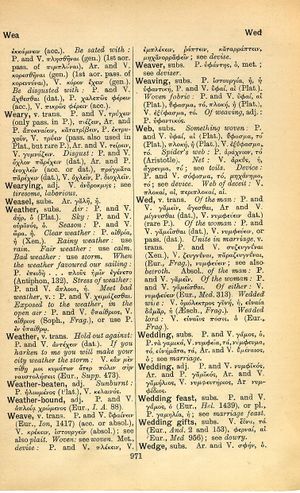wed: Difference between revisions
From LSJ
Σοφία δὲ πλούτου κτῆμα τιμιώτερον → Pretiosior res opipus est sapientia → Die Weisheit ist mehr wert als Säcke voller Geld
m (Text replacement - "<b class="b2">Frag.</b>" to "''Frag.''") |
m (Woodhouse1 replacement) |
||
| Line 1: | Line 1: | ||
{{Woodhouse1 | {{Woodhouse1 | ||
|Text=[[File:woodhouse_971.jpg|thumb|link={{filepath:woodhouse_971.jpg}}]] | |Text=[[File:woodhouse_971.jpg|thumb|link={{filepath:woodhouse_971.jpg}}]] | ||
===verb transitive=== | |||
of the [[man]]: [[prose|P.]] and [[verse|V.]] [[γαμεῖν]], [[ἄγεσθαι]], [[Aristophanes|Ar.]] and [[verse|V.]] [[μίγνυσθαι]] (dat.), [[verse|V.]] [[νυμφεύειν]] dat.) (rare [[prose|P.]]). | |||
of the [[woman]]: [[prose|P.]] and [[verse|V.]] [[γαμεῖσθαι]] (dat.), [[verse|V.]] [[νυμφεύειν]], or. pass. (dat.). | |||
[[unite in marriage]], '''verb transitive''' [[prose|P.]] and [[verse|V.]] [[συζευγνύναι]] ([[Xenophon|Xen.]]), [[verse|V.]] [[ζευγνύναι]], [[παραζευγνύναι]], ([[Euripides|Eur.]], ''Fragment''), [[νυμφεύειν]]; see also [[betroth]]. | |||
Absol., | Absol., of the [[man]]: [[prose|P.]] and [[verse|V.]] [[γαμεῖν]]. | ||
of the [[woman]]: [[prose|P.]] and [[verse|V.]] [[γαμεῖσθαι]]. | |||
of [[either]]: [[verse|V.]] [[νυμφεύειν]] ([[Euripides|Eur.]], ''[[Medea]]'' 313). | |||
[[wedded wife]]: [[verse|V.]] [[ὁμόλεκτρος γυνή]], ἡ, [[εὐναία δάμαρ]], ἡ ([[Aeschylus|Aesch.]], ''Fragment''). | |||
[[wedded lord]]: [[verse|V.]] [[εὐναῖος πόσις]], ὁ ([[Euripides|Eur.]], ''Fragment''). | |||
}} | }} | ||
Revision as of 08:50, 20 May 2020
English > Greek (Woodhouse)
verb transitive
of the man: P. and V. γαμεῖν, ἄγεσθαι, Ar. and V. μίγνυσθαι (dat.), V. νυμφεύειν dat.) (rare P.).
of the woman: P. and V. γαμεῖσθαι (dat.), V. νυμφεύειν, or. pass. (dat.).
unite in marriage, verb transitive P. and V. συζευγνύναι (Xen.), V. ζευγνύναι, παραζευγνύναι, (Eur., Fragment), νυμφεύειν; see also betroth.
Absol., of the man: P. and V. γαμεῖν.
of the woman: P. and V. γαμεῖσθαι.
of either: V. νυμφεύειν (Eur., Medea 313).
wedded wife: V. ὁμόλεκτρος γυνή, ἡ, εὐναία δάμαρ, ἡ (Aesch., Fragment).
wedded lord: V. εὐναῖος πόσις, ὁ (Eur., Fragment).

